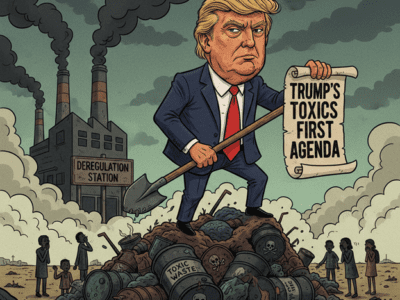The Perils of Inexperience
The Scott Pruitts of the Trump cabinet face some tricky challenges.
There’s even a name for it in sports: “rookie error.” That’s the kind of mistake that talented players make when they’ve been bumped up into the big time.The big issue for appointees like Pruitt is to avoid that kind of mistake — and in the meantime, to accomplish their agendas.
By all accounts, Scott Pruitt is a very able bureaucratic infighter. “Ambitious conservatives abound in deep-red Oklahoma,” AP observes, “but the 48-year-old Pruitt has become known for an extraordinary talent for expanding his power and budget.” Those skills doesn’t mean that he has a broad or deep knowledge of environmental law or policy, unlike other recent EPA heads who have headed state environmental agencies or worked in EPA. Nor, for that matter, does he have much knowledge of how the federal government works.
In a way, he’s like someone who played great tennis in high school being sent off to play at Wimbledon. The management problems alone are far bigger than he has seen in the past: the Oklahoma attorney general’s office has about 70 lawyers — what would be considered a smallish law firm these days, EPA has 15,000 employees and an $8 billion budget. All of this may be somewhat daunting.
Pruitt’s situation – which is not unlikely those of many other Trump appointees — presents an interesting problem: how does Pruitt ensure that the agency’s decisions serve his goals. For example, it would be desirable to have a reasonable prospects of having decisions stand up in court and that regulatory actions end up doing what they’re supposed to. It’s simple enough to say that you’re going to repeal Obama-era regulations, but repeal requires building a careful, well-documented case. And EPA does many other things that can’t just stop, like granting permits needed by industry and developers. How can Pruitt know whether these things are being done efficiently or effectively?
The basic problem is that Pruitt can’t trust the bureaucracy as a source of information, so he will need to turn elsewhere. All of these in effect involve some kind of delegation to a more knowledgeable agent to advise on decisions. Economists have long known that such agency relationships have costs, since it’s generally impossible to keep the agent from pursuing his, her, or its own agenda to a certain extent. Of course, this is no problem if the agent’s agenda happens to coincide entirely with Pruitt’s.
Let’s consider the possible agents. First, he might rely on the bureaucracy. No doubt many staff members will see their jobs as carrying out the goals of the current Administration and will be reliable agents for that reason. Even those agents may resist what they think are indefensible positions. But some other agents will undoubtedly want to sabotage efforts they see as counter to the agency’s real mission, and others will just check out and decide there’s no point in putting in much effort to get things right. And Pruitt isn’t in a good position to know which is which. One effect could be that he gets decisions that he wants, but with errors that will doom them in court, or there may be lengthy delays, or bureaucrats could violate his policies while staying under the radar.
Second. if the political appointees below Pruitt are knowledgeable and share his goals, he can leave the actual decision-making to them and focusing on upping his political visibility. One problem is that they aren’t likely to be completely on the same page as Pruitt – for instance, they may not share his interest in advancing his own political career. The other is that EPA Administrators get called before Congress, and if Pruitt isn’t knowledgeable, he can easily get into trouble, with the enthusiastic assistance of Democratic legislators. Much the same issues apply if Pruitt delegates authority up, leaving it to White House staff to make decisions.
Another option is to delegate to industry, which seems to be what he did in Oklahoma, according to letters published in the NY Times. One problem is that “industry” isn’t a monolith. In particular, the oil industry and the coal industry (along with their respective utility customers) don’t necessarily have the same interests. And industry lobbyists have their own incentives that may not be the same as their clients– for instance, lobbyists may be able to take credit for regulations even if they’re later thrown out by the courts. Of course, maybe Pruitt doesn’t care about that, if he’s planning to head back to Oklahoma to run for higher office. An additional problem is that it will be much harder to keep industry contacts secret in the federal government than it was in Oklahoma given FOIA, the Administrative Procedure Act, and other rules — not to mention the number of EPA employees with an incentive to leak.
A final option is to delegate to conservative think tanks like the Heritage Foundation. But these think tanks themselves may be short on expertise, and in any event may have interests that aren’t 100% the same as his. They may also be more extreme than what industry really wants, leaving Pruitt in the position of pleasing one set of political allies at the expense of another.
Finally, Pruitt may be able to play several of these information sources compete against each other, rewarding the ones whose advice pans out by relying on them more in the future. In the meantime, he can hope that these groups keep each other honest.
This isn’t an impossible game to play. Even a more experienced EPA head than Pruit would have to rely to some extent on a combination of these strategies — though one whose goals were more in line with the agency’s mandate might get more help from the civil servants. But because he is so inexperienced, regardless of his abilities, Pruitt runs a higher risk of making mistakes. That could interfere with the kind of outcomes he may be looking for – for instance, there might be long delays before rollbacks of EPA regulations could take effect. Or even worse, it could result in political embarrassment, if something like the Flint water crisis pops up, or a corruption or sexual harassment scandal, or if he makes repeated gaffes in congressional testimony.
Time will tell how successfully Pruitt navigates these pitfalls. But if he runs into trouble, it won’t be the first time that a lack of experience and expertise has tripped up an energetic new manager.







Reader Comments